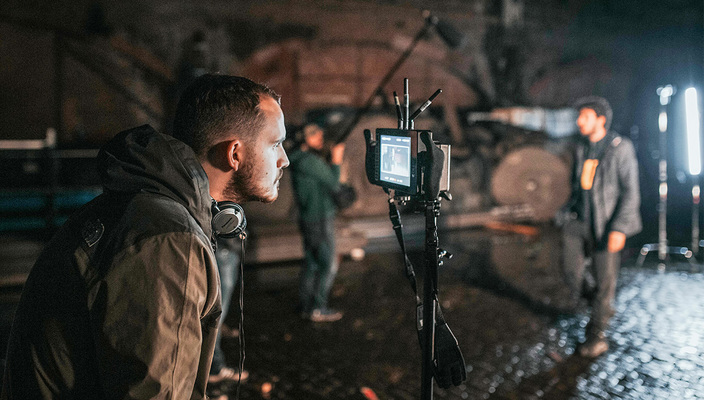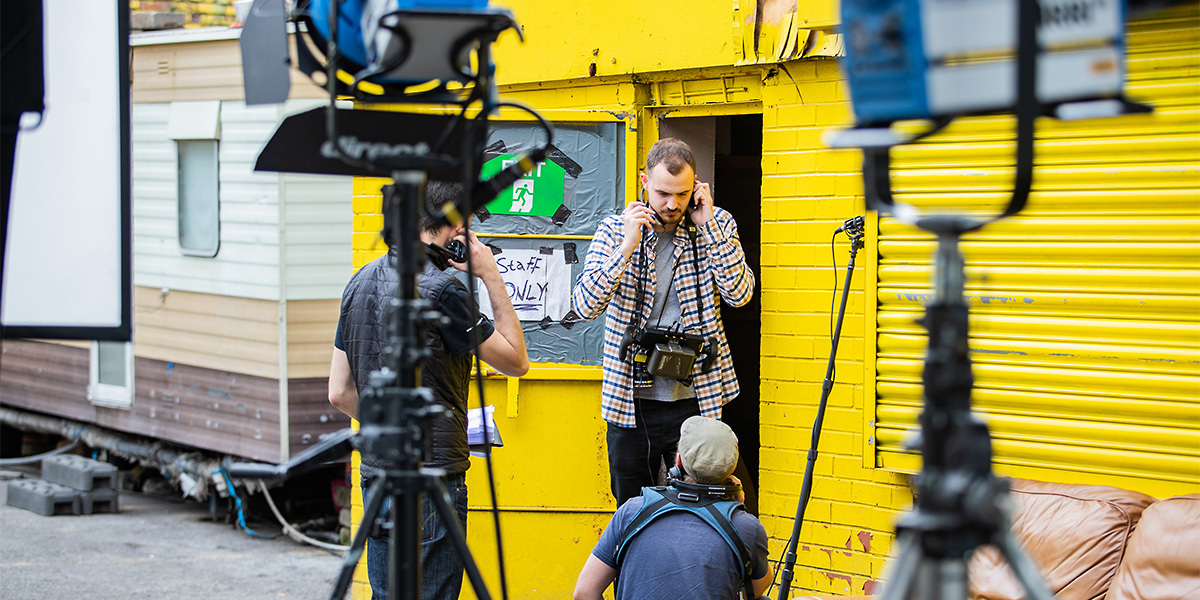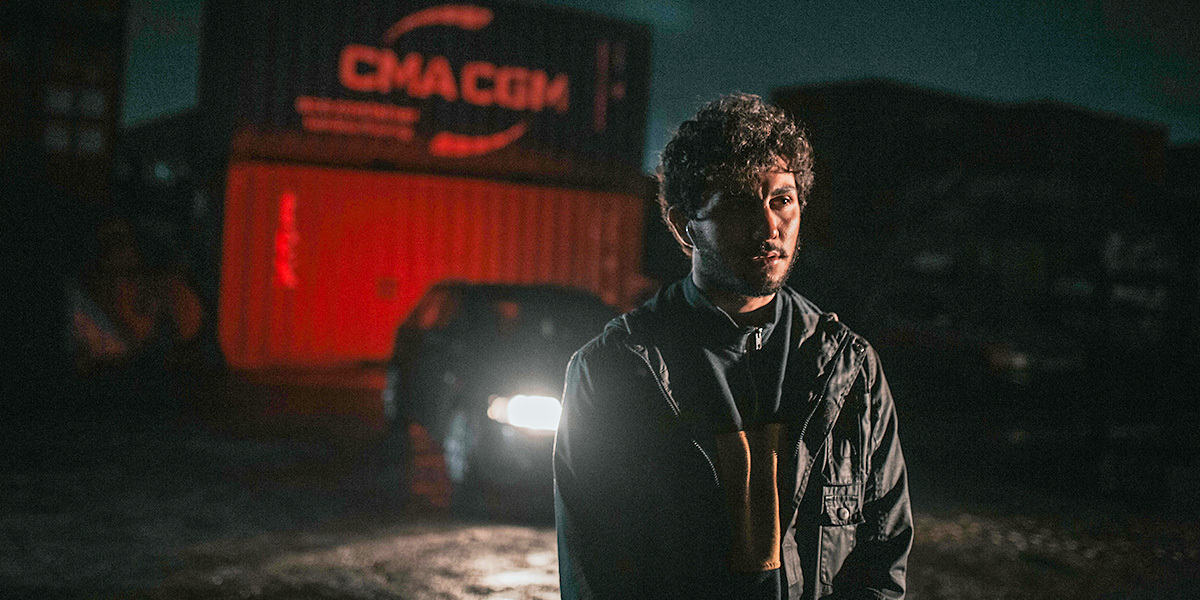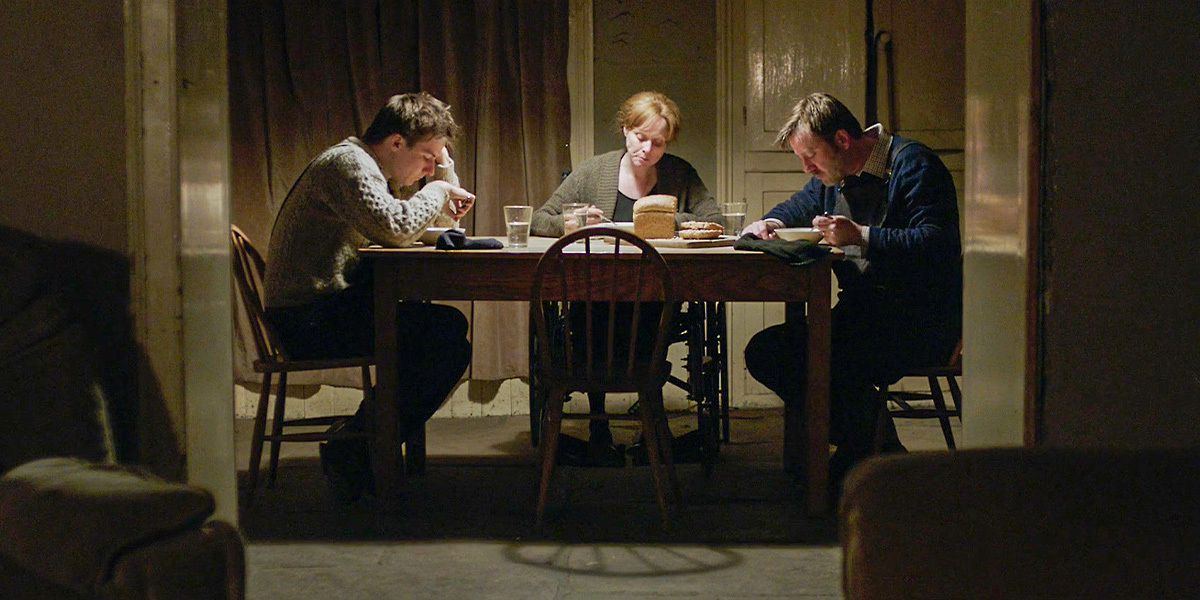Interview: Jack Benjamin GillWe talk to the filmmaker about his debut feature in development


Jack Benjamin Gill chats to us about shorts, developing a debut feature and knocking on industry doors.
In the 10 years since graduating, Yorkshire-born filmmaker Jack Benjamin Gill has steadily been chipping away at the mammoth task of making his debut feature.
In 2016, he made the short film Lambing Season: a taut thriller about a young man who begins to suspect the horrific truth behind his unhappy life on the family farm. Next up was Doggerland: an unflinching look at human trafficking and modern slavery in the UK, made in 2019 with support from Film Hub North and BFI NETWORK.
Since then, Gill has gone through a slew of prestigious talent development programmes and has capped a whirlwind couple of years by being named a Screen Daily Star of Tomorrow 2023. The project that finally propelled Gill towards his debut feature is Rob the Joint: a spikey, state-of-the-nation siege comedy about a young man trying to break his mum out of supermarket security after she’s caught shoplifting a joint of beef.
We sat down with Gill to discuss Rob the Joint - which was initially supported through the BFI NETWORK Early Development Fund - and his journey through the industry.

Congratulations on being named a Screen Daily Star of Tomorrow. How does it feel?
Very silly. Very surreal.
It's a really nice confirmation of everything I’ve been doing; confirmation that I'm not insane! I’ve been working hard trying to tell stories for years, and it feels like it’s finally paying off. That work has been recognised by the industry, which is encouraging.
It feels like there’s a bit of pressure there too. The scheme is in its twentieth year now and its track record is pretty impeccable. The actors that they’ve spotlighted are now household names. And I know exactly who the filmmakers and practitioners that they’ve celebrated are, and what they’ve gone on to do.
So you’ve got to live up to that expectation. I hope that when people look back on the class of 2023 in 5 years time, they can say: “that’s the guy who went on to make this.”
You’ve featured on various talent development programmes now - does it feel like everything is moving in the right direction?
It’s like buses, isn’t it? It feels like some traction has been building in the last 18 months; everything that I’ve applied for has snowballed.
I think it comes from the momentum around this particular script. We’re working on a film called Rob the Joint, which was initially supported by Film Hub North and then it went into development with Film4. Shortly after that, we landed NETWORK@LFF - and I think the traction of being with Film4 led us to that.
The script was then BAFTA Rocliffe shortlisted. Then, off the back of that, I applied for Stars of Tomorrow. One thing has led to another, and all those doors that were closed become less intimidating and start to open.
I think it’s really because we’ve got a good script. That’s where it started. It’s not like I’ve done anything wildly different; I’ve just applied for the same things that I've always been applying for. You have that list of maybe 20 things that you apply for every year, and they all say “no.” With the odd “yes” every now and then. But there has been this wild momentum in the last 18 months where it’s been going beyond well. And it’s down to this story.
Did it feel like you had been knocking on those doors for a while?
Yeah - 100%.
I went to art school in Manchester and graduated in 2012. I was working in retail and making films at the weekend, so I’ve basically been making shorts and writing scripts for 10 years.
We made Lambing Season through iShorts and Doggerland through Film Hub North and BFI NETWORK. We made a Channel 4 Random Act and a Straight 8. We also had another feature in development with the BFI which didn’t take off, so I went and wrote Rob the Joint.
The first draft of Rob the Joint was written in about 6 weeks - basically in a bout of frustration and a bit of mania. We’d just got a “no” on the other script, and I’d been in a room for 6 weeks anticipating that decision. I was committed - and now here we are.

Looking back on those shorts, Doggerland feels perhaps more relevant now than when it was first made. How do you view that film?
I don’t know how to describe it; it feels like some strange, self-fulfilling spiral.
We’ve all seen the stories about the Bibby Stockholm barge. We’re now putting people in these shipping container environments at a governmental level. It’s appalling - and way beyond what I could have imagined when researching and writing our film.
It was a difficult short to make for a number of reasons. It was a story that was outside of my own perspective, and I was well aware of the potential problems of being a white British bloke making this film. I’ve never taken as much care when trying to write something before. It was a wildly different script when we first started, but we did so much research, and the story and the characters had to change as a result of that. It was a true exercise in empathy.
There were challenges on release too. The film came out during COVID, and I’m not sure if people wanted to swallow that kind of short at that time. It had a good festival run for about 18 months - mostly online. But then it played at HOME and screened for about 6 weeks before Boiling Point, which was great. It really found its audience in the cinema.
Making Doggerland felt like going down a rabbit hole. The premise and the themes were so relevant and politically charged, and the tone was so dark in response to that.
Now, with Rob the Joint, I’ve pivoted. There’s still a real political leaning to the film and it has a lot to say about the times that we find ourselves in, but tonally it’s wildly different to Doggerland.
Have you made a conscious decision to move in a different direction after creating shorts which were so tonally dark?
I suppose the move towards the tone in Rob the Joint feels like the solidification of a voice for me.
Lambing Season doesn't have any kind of political leanings in any way, shape or form. It’s a story about the collapse of a family, wrapped up in a thriller. Exploring family dynamics is a massive thing for me personally, and I love combining that with genre elements.

Doggerland is a genre piece too. But because of the subject matter, there was no way I could lean into that in a way which might trivialise or exploit the human beings at the heart of the story.
So when we came to do Rob the Joint, it felt like a combination of the two - but with extra energy. You've got the thriller stuff, you've got the political stuff, you've got the family stuff - but it all collides with a sense of humour and joy and rebellion.
I’ve taken quite a tense genre situation which in principle should take place in a bank, and I’ve transferred it to a supermarket. We’re in this place that’s populated by joints of beef and tins of full English breakfast and packets of angel delight - so every time you hit a genre note in the story, you don’t have the usual toolbox of guns or violence that you would find in a US genre film. What you have is a supermarket and a family, so you end up subverting all of those expectations and those genre beats. And in doing that, you end up having fun.
Rob the Joint feels achievable as a debut feature.
Definitely - that was intentional.
There was a point where we could have left the supermarket and gone on the run - gone full Thelma & Louise. But I made a conscious choice to keep it in the supermarket.
It’s a contained film: it takes place in a single day, in the supermarket and on the street - and that’s the entire film. There are elements of scale with crowd scenes, but really a lot of the filming will be with key cast in what will inevitably be a set-build.
What I really want to do is find the street with a glass fronted unit and then have the set-build on location - rather than using different locations for the interiors and exteriors. I love the idea of an actor being able to spill out of the set and straight onto the very street that we shoot the rest of the film on. That would be the dream: we just spend 8 weeks in that space and make a film.
Are you looking at projects beyond Rob the Joint?
Yeah - I've committed to a certain process that for me is really helpful.
With Rob the Joint, we got development support from Film4 on a completed first draft. I just went and wrote it - no money beyond the treatment, nobody commissioned me to write it further. I just wrote the entire thing, sent it to Amy O’Hara at Film4 and then they came on board for development.
That’s kind of become my ethos now, which can be difficult. It means you have to write on spec, and hope that somebody likes the script at the other end.
I just find treatments really tricky. Rob the Joint was supported through the Early Development Fund to develop a treatment - but I was writing scenes alongside the treatment, and basically developing the treatment and the script at the same time. The treatment was largely reverse engineered.
I’m not a fan of the traditional treatment process - progressing from a five-page outline to a full script. I’d only work with a one-pager now; something that simply outlines the key narrative beats. After that, I’m best off committing to the script - otherwise how do you know how your characters speak, or how they act, or how you’re going to meander away from those initial story beats?
If I had tried to sit down and plot Rob the Joint beat-by-beat, I wouldn’t have discovered the mania that exists in-between all the narrative. People collapse, people throw up, tins get thrown about, people say funny, human dialogue in the moment - because I’m writing it in the moment.
Emerging filmmakers might be waiting for somebody to give them a chance, or waiting for the funding thing. They’ve maybe got a page outlining what the idea is and they want to take that to someone to get development support. That’s fair enough, but I think: just get on with it.
I don’t think you can sell on spec; nobody’s going to buy that script and make a film out of it. You’ll have to develop it and accept notes, which is all useful. But if the script is strong and exciting, even if it’s just a sample of the first pages, you can get people on-board without making them read some dense piece of prose.
At the end of the day, if you want to write and direct, you need to be writing. Not waiting for someone to give you permission to do that.
Watch Doggerland
Doggerland was supported by Film Hub North with BFI NETWORK Short Film Funding.
Rob the Joint was supported by Film Hub North through the BFI NETWORK Early Development Fund.







